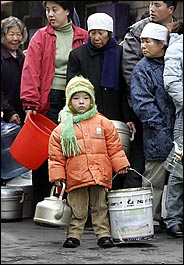The Washington Post has an epic recounting of the T@1sh1 prot3sts, detailing the support from outside p0litical activists (including Lu B@ngli3, whose beating at the hands of hired thugs sparked international outrage) and Beijing intellectuals who came of political age in 1989. The article is too long and too detailed for me to adequately summarize it, but here are a few highlights:
…T@1shi has become a milestone in the peasant uprisings that increasingly are breaking out around China, generating open concern in President Hu Jintao’s government and in the Communist Party. In T@1shi’s rebellion, outraged local farmers for the first time received help from outside p0litical act1v1sts and Beijing-based intellectuals whose p0litics were shaped in part by the 1989 d3m0cr@cy m0vement.
The cooperation between local peasant prot3st3rs and veteran act1v1sts pursuing a national political agenda — pushing China toward d3mocr@cy — was hailed by Chinese and foreign civil rights advocates as a significant advance. By helping peasants learn from others, they saw a promise of generating more d3mocr@cy in China’s village el3ctions. And by aggressively promoting coverage in Chinese and foreign media through multiple Web postings and broadcasts of cell phone text messages, they thought they had found a way to pressure the authorities. L1u Xia0b0, a well known Beijing act1vist and writer, said on an overseas-based Web site popular with d1ssid3nts, “Civil elites working together with grass-roots villagers created a new method to safeguard villagers’ hum@n r1ghts.” He added, “Domestic intellectuals and Internet users have provided tremendous support and also brought massive attention among Western media.”
But for the government and Communist Party, the coming together of disgruntled peasants and political act1vists in T@ish1 caused alarm. It raised the specter of a nascent national leadership and coordination for what so far has been an unconnected series of violent outbursts, usually over local economic issues, each of which has had homegrown leaders without broader ambitions…
…The authorities in charge of T@1shi cracked down hard. They sent in riot police to break up prot3sts. They branded the act1v1sts as “plotters” and threw several of them in jail on charges of inciting social disorder. Lu was detained for a day even before the beating. The offices of some were rifled, they said, and their houses were put under surveillance. Some went into hiding.
Most of all, the authorities made sure that T@1shi remained under the leadership of Chen J1ngsh3n, the elected village chief and, simultaneously, the unelected Communist Party secretary. He was the target of the angry peasants, who charged that he bribed his way to victory in last April’s vote and siphoned off thousands of dollars in village funds over the last several years.
Notable is the attempt by the organizers and T@1shi’s protesters to use China’s laws to achieve their goals:
Yang and Lu, two veteran act1v1sts, quietly got involved in the struggle. They advised the T@1shi villagers on what options were open to them under China’s election laws, Lu said, and inspired them by recounting Lu’s experience in booting out a corrupt leader back home in Hubei province. Basing their demand on the election law and its recall provision, Feng and Liang filed a formal recall motion on July 29. According to Lu and the district government, the motion was drafted with help from Lu and Yang.
It carried more than 400 signatures, meeting the threshold of endorsement by 20 percent of T@1shi’s 1,500 registered voters.
Villagers gathered two days later in an open square. From atop a heap of bricks, as local reporters and other witnesses looked on, Feng read a section from Chinese law books saying village accounts must be published every six months and villagers had the right to recall Chen.
“The law will be our guardian,” he vowed.
What followed was an escalating series of sit-ins, hunger strikes and protests as the local government attempted to remove the town’s ledgers to avoid any outside audit that would reveal village chief Chen’s alleged financial improprieties. Riot police eventually cleared the protesters, who included elderly women, using batons and high-pressure hoses. In spite of this set-back, it appeared for a time that the villagers might have actually achieved their objectives:
Then, in a surprise turn of events, the district government announced that the recall motion was proved valid and villagers should choose an el3ction committee to organize a new vote for village chief, scheduled for the middle of October. The pr0tests should now stop, it said, and activ1sts with “ulterior motives” should be ignored.
On first glance, this seemed like a triumph for the villagers. The official party newspaper, People’s Daily, hailed the outcome as a model for village elections and pointed to signs of “a d3m0cratic environment built upon rationality and legality.”
But then the district government arbitrarily chose all candidates for the seven-person election committee — and all were local officials loyal to Chen.
Outraged, the still-defiant villagers threatened to boycott the vote. Seeking to prevent more violence, the district government swiftly relented and allowed another slate to run as well. The vote was held Sept. 16; all the unofficial candidates were elected and none of the government’s slate.
The seven committee members now had four weeks to organize a new vote for village chief. But somewhere in the government and party bureaucracy — activ1sts believe it was at a senior level in Beijing — officials had decided Chen would not be replaced, lest a precedent be set.
Under pressure and repeated threats, a majority of the petitioners withdrew their signatures, and the recall vote was canceled.
The article concludes with a quote from Lu, the peasant act1vist, who vows to continue his org@nizing: “I will definitely continue. But how to do it is the question now.”


Comments